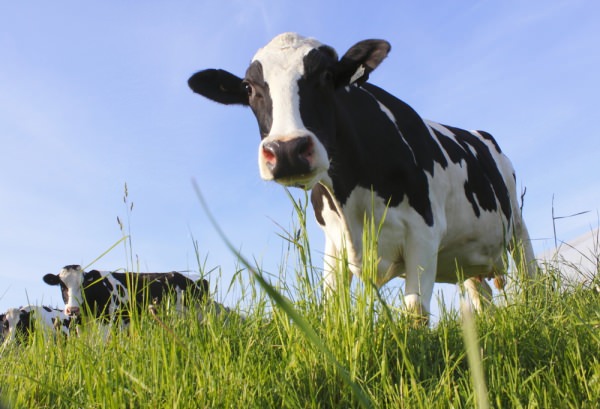Love it or hate it, unless you seek out hormone-free options, the food you eat likely contains additional hormones. From meat to milk, hormones are added to increase productivity. Some are produced naturally by the foods themselves. We teamed up with our favorite registered dietitian Mary Hartley to look at foods containing hormones, what their effects might be and how you can avoid them.
Hormones are most commonly found in meat, milk and plants. In meat and milk, they are added through production. Steroid hormones are given to beef cattle to make them grow faster, build more muscle and make their meat leaner. Two-thirds of all cattle and about 90 percent of the cattle on feedlots in the United States are given hormones. Six steroid hormones are approved by the FDA for use in food production. They are: estradiol, progesterone, testosterone, zeranol, trenbolone acetate and melengestrol acetate. Steroid hormones are released into the animal from a pellet that is implanted under the skin of the ear. Due to federal regulations, these hormones can only be used on sheep and cattle.
Another type of hormone injected into cows is bovine growth hormone (bGH). Used specifically in dairy cows, bGH is produced using recombinant DNA technology, and the result is known as recombinant bovine growth hormone (rbGH) or bovine somatotropin (rbST). Up to 30 percent of the cows in the United States may be treated with rbGH to increase their milk production.
Not all hormones found in food were inserted artificially. More than 300 plants, especially legumes and leafy green vegetables, contain naturally occurring phytoestrogens. The phytoestrogens are similar to estrogen in how they act in the body. One of the biggest sources of phytoestrogens is soy. “Soy isoflavones are phytoestrogens, meaning they can mimic estrogen and may help reduce side effects like hot flashes during menopause,” said Health Editor for About.com Rachel Berman. “However, studies have shown that taking too much may promote cancer growth. Instead of taking supplements, choosing foods rich in soy like edamame, soy milk, soy nuts, miso, tofu and tempeh may be your best bet. And always check with your doctor regarding how hormones in foods may impact your health,”
A concern about hormones is they may cause increased instances of cancer. The question of whether eating meat from hormone-treated animals affects breast cancer risk cannot be answered because no study has occurred that examines the risk in women who eat meat from hormone-treated animals compared with the risk in women who eat meat from untreated animals. However, the amount of steroid hormone that is eaten in the meat of a treated animal is negligible compared to what the human body produces each day. Milk from rbGH-treated cattle has been found to have slightly more of a naturally produced protein that may increase the risk for breast cancer. Studies are underway to research this claim. Many countries have banned rbGH because of the harm that it may do to the animals. Some American companies have also taken a stance against rbGH, like Ben and Jerry’s Ice Cream.
Most countries do approve the use of growth-promoting hormones in beef production, including Canada, Australia, New Zealand, South Africa, Mexico, Chile and Japan. However, in the 1980s, the European Union banned meat from animals treated with steroid growth hormones. Critics cite political and economic reasons, rather than scientific analysis. All 27 countries of the EU, Canada, New Zealand and Australia have banned the use of rbGH in milk destined for human consumption.
If the thought of hormones in your food makes you uneasy, there are a few ways to limit your intake. To avoid hormones in meat, look for a “USDA Organic” seal. The USDA standards for products labeled “organic” require that animals not be treated with either growth hormones or antibiotics; products bearing the seal are in compliance with these rules. For milk, check the packaging or label for “no added hormones” or “from cows not treated with rBGH.” Do not go by the words “natural” or “free range.” Until we have the results of more rigorous research, people can use these tips to err on the side of caution and limit their hormone intake.
Also Read:
Is a GMO-Free Oregon a Real Possibility?
Gluten-Free Labels Now Standardized by FDA

